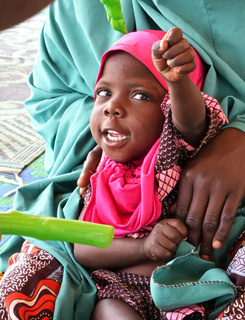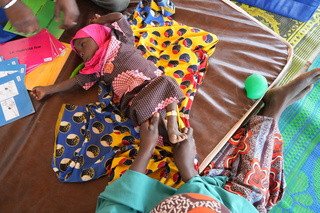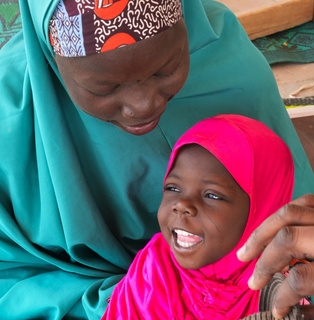share

Massalouka, aged two and a half, during a stimulation therapy session in Bakwassa, in Niger. | © J. Labeur / HI
As a consequence of malnutrition, Massalouka, aged two and half, due to weakness of her muscles, could not sit up unaided. Thanks to HI's rehabilitation services in Niger, she is making progress.
Massalouka's smile lights up the room as she grabs the toy handed to her by HI's physiotherapist. A real victory for this little girl who suffered from severe malnutrition that left her with developmental delays. HI is helping her with individual stimulation therapy sessions – play-based rehabilitation care for malnourished children, done by rehabilitation professionals.
 Massalouka comes from a large family: she has three brothers and fifteen half brothers and sisters. Her mother, Manssoura Larwane, hugs her tightly as she recalls how it all began.
Massalouka comes from a large family: she has three brothers and fifteen half brothers and sisters. Her mother, Manssoura Larwane, hugs her tightly as she recalls how it all began.
"When she was only six months old, Massalouka contracted a serious form of malaria, followed by very severe diarrhoea that left her completely dehydrated. In the days that followed, I noticed that she was losing energy and that it was affecting her psychomotor development," explains Manssoura, who still shudders at the memory of it.
The little girl started to lag behind the other children and her parents were very worried about her. Due to her muscle weakness she couldn’t pick up objects or roll over on her own.
 Massalouka's parents were devastated. They worried about their daughter constantly and their day-to-day life was seriously affected, with the whole family focused on Massalouka needs.
Massalouka's parents were devastated. They worried about their daughter constantly and their day-to-day life was seriously affected, with the whole family focused on Massalouka needs.
In the mornings, it was her father's turn to take care of Massalouka. Worried about his daughter, he would often arrive late in the fields or at the stall where he sold snacks, and would spend his days thinking about her, neglecting his crops or his customers and hurrying home in the evening. So, when Manssoura heard about HI's stimulation therapy sessions for malnourished children, she jumped at the opportunity.
"My neighbour told me about HI's stimulation therapy sessions because she had been going with her son and he could now sit up on his own. So when she suggested I go with her, I didn't hesitate. The first thing I noticed when I arrived was how many children there were. You could hear shouts and laughter everywhere," says Manssoura.
Manssoura has to walk more than ten kilometres with her daughter on her back to reach the health centre where HI is running the stimulation therapy sessions. They have been attending together for a few months now and the little girl’s progress is spectacular! She can now get up in sitting by herself, and even starts to pull up herself by wanting to reach her toys.
HI’s teams have also taught Manssoura exercises that she can do with her daughter at home. Play-based activities where the mother keeps talking to her daughter by looking in to her eyes or by making her count objects and name them for example, will enhance her cognitive or communication skills or her motor skills. So that little by little, Massalouka can continue to make progress in her own environment. Today, Massalouka is a little girl who radiates joy.
"Now that she can sit up and grab things, Massalouka is much more independent. When I leave her with her toys, she can keep herself busy. Her father can concentrate on his work again, her brothers on their activities and I have more time to take care of our home," says Manssoura.
 Manssoura’s dream is that, , one day, Massalouka will be able to play with other children. You only have to look at the little girl's infectious smile and boundless energy to know that when that happens, there will be no stopping her!
Manssoura’s dream is that, , one day, Massalouka will be able to play with other children. You only have to look at the little girl's infectious smile and boundless energy to know that when that happens, there will be no stopping her!
Stimulation therapy is provided by HI to support the development of children who have suffered the consequences of malnutrition. Play is a therapeutic tool that allows physiotherapists to stimulate the children's interest and encourages them to perform movements that help their physical and psychomotor development.
Maradi, despite being the economic capital of Niger, is one of the regions most affected by malnutrition. The causes are varied, ranging from inadequate or late treatment of children when they fall ill to a lack of knowledge about good feeding practices and the nutritional qualities of food. Finally, the consequences of climate change also play a role, generating episodes of drought or flooding that can destroy crops and lead to poor harvests.
HI has been running a rehabilitation and stimulation therapy project for malnourished children in the Maradi region since 2022. The project will run until 2026. Since the launch of these activities, HI has accompanied more than 1,300 children in playgroup sessions and also in individual sessions of stimulation therapy done by rehabilitation professionals, provided 30 health centres with adapted equipment, trained 100 health professionals and raised awareness among more than 2,800 parents. Eventually, 30,000 children will benefit from rehabilitation care adapted to their needs and 60,000 parents will benefit from awareness raising. These activities are made possible thanks to the support of the DGD.








HI is an independent and impartial aid organisation working in situations of poverty and exclusion, conflict and disaster. We work alongside people with disabilities and vulnerable populations, taking action and bearing witness in order to respond to their essential needs, improve their living conditions and promote respect for their dignity and fundamental rights.
HI is an independent and impartial aid organisation working in situations of poverty and exclusion, conflict and disaster. We work alongside people with disabilities and vulnerable populations, taking action and bearing witness in order to respond to their essential needs, improve their living conditions and promote respect for their dignity and fundamental rights.